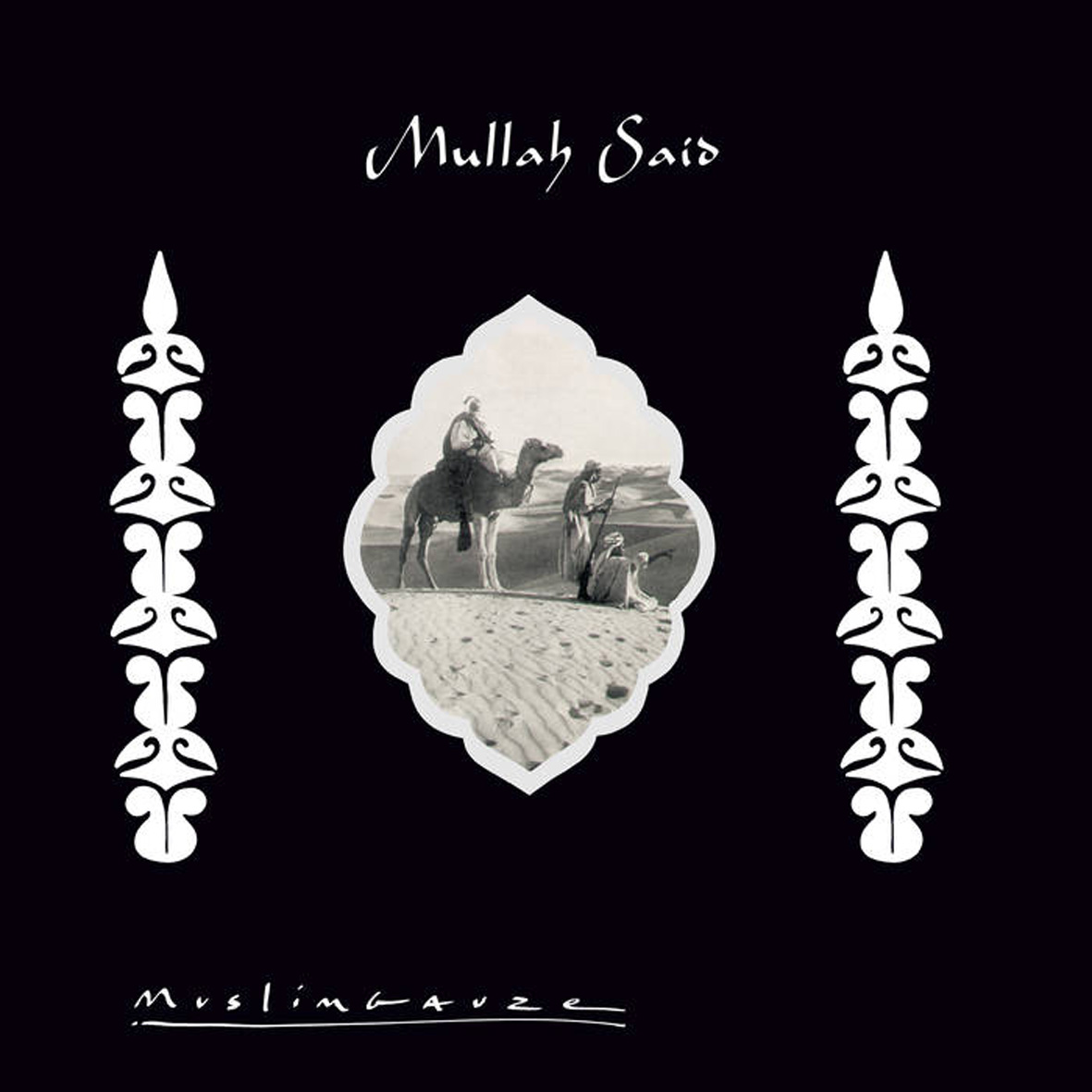Muslimgauze, "Mullah Said"
 Earlier this year, Staalplaat took a break from their plunge into Bryn Jones' seemingly endless archive of unreleased/hyper-limited material to put out a double-LP vinyl reissue of this beloved landmark album from 1998. While the vinyl format is an odd choice for this particular release (I have the digital version), I am delighted by this new reissue campaign: the sprawling Muslimgauze discography is a hopelessly intimidating and overwhelming labyrinth for all but the most die-hard fans, so the world definitely needs a knowledgeable curator to call attention to the most timeless and essential releases in the Muslimgauze canon. This is one of those. Normally, my own favorite Muslimgauze albums tend to be the more ethno-percussion-driven ones, but Mullah Said's heady drone/dub-inspired collage aesthetic is a striking exception, as it stands as one of Jones' most immersive, evocative, and fully formed works.
Earlier this year, Staalplaat took a break from their plunge into Bryn Jones' seemingly endless archive of unreleased/hyper-limited material to put out a double-LP vinyl reissue of this beloved landmark album from 1998. While the vinyl format is an odd choice for this particular release (I have the digital version), I am delighted by this new reissue campaign: the sprawling Muslimgauze discography is a hopelessly intimidating and overwhelming labyrinth for all but the most die-hard fans, so the world definitely needs a knowledgeable curator to call attention to the most timeless and essential releases in the Muslimgauze canon. This is one of those. Normally, my own favorite Muslimgauze albums tend to be the more ethno-percussion-driven ones, but Mullah Said's heady drone/dub-inspired collage aesthetic is a striking exception, as it stands as one of Jones' most immersive, evocative, and fully formed works.
One thread that runs endlessly through the Muslimgauze discography is Bryn Jones' obsessive recycling and self-cannibalization, as the same motifs appear again and again and many of his better ideas resulted in multiple variations of the same song.That curious approach arguably reached its apotheosis with this album, as two of its lengthiest songs ("Every Grain of Palestinian Sand" and "Muslims Die India") appear twice, accounting for roughly 18 minutes of a 65-minute album…and those two pieces can only be differentiated by their subtly different bass patterns and shifts in pace.And the opening "Mullah Said" does not sound much different either.It is unusual sequencing, to be sure, but it does not feel redundant, lazy, or one-dimensional.Rather, Mullah Said feels like a single, massive, trance-inducing epic with relatively irrelevant differentiations between its various movements.As such, the vinyl format fundamentally disrupts Mullah Said's raison d’etre: the mesmerizing cumulative power of the album's enveloping, hallucinatory repetition.I imagine it is quite hard to remain beguiled by Mullah Said's exotic and unworldly spell when you have to flip a record three times to get to the end, though I suppose roughly the same effect could be achieved by just playing the same side of the album four times in a row.That is not a negative statement about the music itself, mind you–just an observation that Mullah does not have a dramatic arc that gradually unfolds: it is more like a swirling and mysterious aural hallucination to live inside.Concepts like "beginning" and "end" do not hold much meaning here.That said, people love vinyl, so I cannot fault Staalplaat for their choice: a deluxe vinyl reissue is an event that generates excitement–a reissued CD is not.
In essence, Mullah Said is built upon an understated (yet perfect) infinite groove of brooding bass tones and shifting electronic drum patterns.Aside from the tensely relentless kick drum pulse in the first "Every Grain of Palestinian Sand," Jones tends to maintain a languorously lurching dub-like pulse, which provides an optimally spacious canvas for all of the other dub-like flourishes (drifting voices, echoing percussion, etc.).There are occasional loops of sitar/tambura melodies and some wonderfully menacing swells of buzzing string drones that serve as recurring motifs to give the album a sense of structure, yet the true beauty of Mullah Said lies in everything on the periphery: this album is a vibrant, multilayered, and complex tour de force of clattering hand percussion, evocative field recordings, and enigmatic snatches of dialogue.In the past, I have critiqued Muslimgauze for Jones' exasperating tendency to endlessly move on to the next project without lingering around to fully flesh out his best ideas and Mullah Said is an unexpectedly dramatic swing in the opposite direction: it is basically just a simple bassline and sinister-sounding sitar buzz painstakingly expanded into an incredibly rich and detailed fantasia.It feels like I was dropped inside a nightmare set in an unknown Middle Eastern city and all I know is that something extremely significant just happened, but trying to piece together exactly what proves to be incredibly elusive.I am completely enveloped in an unnerving chaos of gunshots, lamentations, prayers, radio transmissions, shouting men, speeding trucks, conspiratorial-sounding conversations, and a host of unrecognizable and unfamiliar other sounds.Sometimes it feels like I am just wandering through a marketplace and other times it feels like I just stumbled into the aftermath of a massacre, which is a very neat trick indeed: Mullah is built on constantly shifting sands and its unstoppable forward motion makes it impossible to ever fully get my bearings.Despite that seemingly amorphous structure, however, Jones maintains a deliciously constant balancing act of tension and release, as these pieces regularly blossom into small-scale crescendos of intensity or oases of comparative calm (or at least simmering unease rather than boiling unease).
As swirling, lysergic, and ambiguously malevolent as it is, however, Mullah Said is curiously bookended by glimpses of simple beauty: it opens on a somewhat meditative tone with a call to prayer and closes in extremely bizarre and disarming fashion with "The End."The crux of "The End" is just a woman quietly singing a pretty song to herself, seemingly surrounded by a gibbering chorus of birds.Left unmolested, it would be a perfectly lovely and hopeful coda for Mullah Said's darkly heavy and hallucinatory journey, but Jones repeatedly disrupts it with a strange percussion loop that sounds weirdly arbitrary.Or perhaps the disruptive loop deliberately serves to show that bliss and tranquility are but a flickering mirage.Whether it was meant as a powerful final commentary or just a somewhat half-baked collision of studio scraps that perversely felt right, I will never know.Bryn Jones was a complicated man and I would probably go insane if I ever tried to nail down his intentions.In any case, despite Jones never having been to the Middle East, Mullah Said paints an extremely vivid picture of the region as it existed in his head, distilling all of its rage, turmoil, and beauty into a deeply compelling and haunting aural postcard from an imaginary city.Mullah Said is not just one of Muslimgauze's finest albums–it is one of the most radical and inventive "outsider" albums to ever emerge from the dub tradition.
 
 



